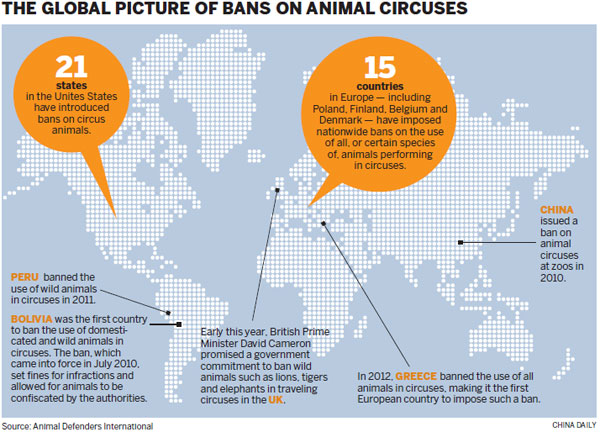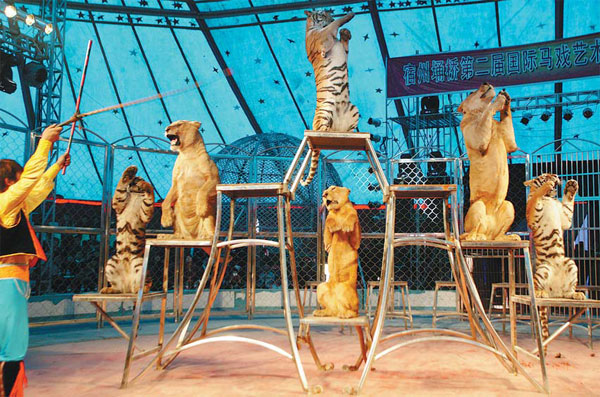Hard times for the lords of the rings
Updated: 2014-11-07 11:43
By Zhu Lixin and Wang Qian(China Daily Europe)
|
|||||||||||
A ban on performances by circus animals could spell ruin for a traditional industry
Until three years ago, Li Chengjian regularly arranged circus performances in zoos during China's annual weeklong National Day holiday. Those glory days are long gone, though.
"Everything has been changed by the government's ruling that animal circuses must stop performing at zoos," says the 36-year-old owner of the Suzhou Circus Family Animal Performance Group, the third generation of a well-known circus family from Yongqiao, in Suzhou, Anhui province.
In October 2010, in a guideline aimed at tightening the management of state-owned zoos, the Ministry of Housing and Urban-Rural Development ordered zoo managers not to host circus performances featuring animals.
Li's circus had performed at Nanjing Hongshan Forest Zoo for 14 consecutive years, but in 2011 his contract was cancelled. Other zoos quickly followed suit, leaving Li and his troupe with little work.
Before the ban, animal circuses performed regularly at zoos across China, but in 2010 an investigation by the State Forestry Administration named 53 zoos where animals were suffering severely because of abuse and cruel circus performances.
Liu Huili, an animal rights supporter with Green Beagle, a Beijing-based NGO, says the performances, including animals walking on wires, jumping through hoops of fire, performing handstands, and boxing, were widespread in the country's zoos and parks, and the practices seriously damaged the animals' physical and psychological health.
"The ban is an encouraging sign for animal protection," she says.
In a previous interview with China Daily, Hua Ning, campaign manager for the Beijing office of the International Fund for Animal Welfare, says the restrictions on animal performances are positive moves in the campaign to protect animal rights.
"In the long run, the government should guide zoos back to educating people about the beauty of nature and informing the public about how to better protect the Earth's magnificent creatures," she says.
While the ban has won praise from animal rights activists, many circus operators have protested that their work does not equate to animal abuse.
Li Chengjian's cousin, Li Xianfeng, also runs a circus. He says every animal has to be trained from a very young age, but only the promise of food will induce it to perform, not cruelty or pain. Violence does not work, he says.
In 2006, the China Federation of Literary and Art Circles and the China Acrobats Association named Yongqiao - Li Xianfeng's hometown - the "City of Circuses", the only place in China to be awarded that honor.
"Running circuses is how the local people have made their living for generations," Li Chengjian says.
About 15,000 people in more than 400 circus groups from the district provide performances across the country, says Zhang Yongheng, deputy head of the Yongqiao Cultural Center and director of Yongqiao Intangible Cultural Heritage Office. Zhang estimates that about 2,000 Siberian tigers have been raised in circuses in the district.
The ban has made life tough for everyone engaged in the local circus industry, and many have had to adapt to survive.
Li Chengjian's circus has about 40 Siberian tigers, more than 30 African lions, about 30 bears, and a large number of other animals, making it the largest private circus in East China.
Since the ban came into force, most of the animals have been housed at the Nanjing Pearl Spring Scenic Spot Area, where Li Chengjian has an animal-breeding center.
Now that the animals can no longer be used for performances, he has been forced to employ a troupe of acrobats to perform shows twice a day.
"Since 2011, the animals have just been raised there, and the trainers have become specialist breeders. The cost of the animals' food and the employees' salaries are quite a burden on me, but I have no alternative because the animals are protected by law," he says.
One of the options left to him is to emulate many of his peers from Yongqiao and take his show on the road to perform at places that are not covered by the legislation.
Li Xianfeng's circus now mainly performs at a private, tourist eco-ranch in the suburbs of Cixi, a city in Zhejiang province. "The private ranch is not affected by the new rule, but working in state-owned zoos has become impossible," says the 35-year-old.
He has spent more than 900,000 yuan ($147,000) to purchase a mobile performance space, containing a stage, 1,200 seats and standing room, in preparation for the worst-case scenario when he needs to travel for business.
During the National Day holiday, Li Xianfeng and his father returned to Yongqiao to give performances broadcast by the local TV station. It was the first time the family had organized a show in its hometown since the 1980s, when Li Xianfeng's father decided to tour the circus around the country.
The shows, held on five consecutive days, drew a combined audience of about 30,000 and brought the partners gross revenue of about 2 million yuan, including money from tickets and advertising.
The most popular part of the program featured the tigers, which often appear in the ring alongside lions.
To transport the tigers, the only national Class A protected animal in the circus, the family had first to obtain permission from the local government before turning to the forestry departments at the municipal, provincial and central levels.
Despite the stringent regulations on the transportation of animals, activists say the rise in the number of full-time traveling circuses will result in greater suffering.
Hu Chunmei, an animal rights activist with the Nature University, says animals in traveling circuses suffer from being constantly caged during tours that can last days, or even months, which may cause sickness.
"Animal circuses should be banned altogether, not just in zoos and parks," Hu says.
In response, some circus owners and enthusiasts say the activists have gone too far.
Zhang of the Yongqiao Cultural Center says the best way to protect animals is to allow them to play roles in society, making them a part of people's lives.
A spokeswoman for the Beijing Aquarium, who declined to be named, says the training routines for dolphins are animal friendly and never involve punishment.
"It's not how the animal activists describe it. They are wrong to say that the training is against the animals' wills, not to mention abusive," she says.
Xu Changzhou, a circus owner in Yongqiao, says people who own animals are the ones who love them most: "I care about every tiger, lion and bear I have raised since they were cubs. The abuse of animals is certainly not allowed in my circus."
Contact the writers at zhulixin@chinadaily.com.cn and wangqian@chinadaily.com.cn
|
Tigers and lions at an international circus festival in Suzhou, Anhui province, in 2010. Wu Zhengrun / Xinhua |

(China Daily European Weekly 11/07/2014 page26)
Today's Top News
China, Russia agree on military coop projects
Faster pace set in bid to protect Internet
US, France cite concerns about Iran nuclear talks
China donates $2 million to WHO to combat Ebola
Policy banks to lead Silk Road infrastructure fund
Ukraine's rebel leader sworn in
World Cup-winning captain succeeds coach at Evergrande
Ukraine rebels announce results of 'elections'
Hot Topics
Lunar probe , China growth forecasts, Emission rules get tougher, China seen through 'colored lens', International board,
Editor's Picks

|

|

|

|

|

|






